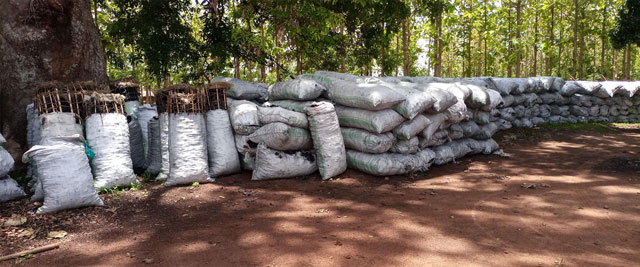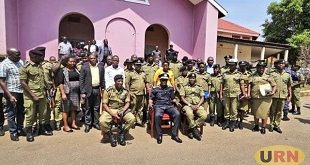
Kampala, Uganda | THE INDEPENDENT | A report by the Global Initiative Against Transnational Organized crime has faulted the Uganda Police and the Army for their role in illegal charcoal trade.
The research conducted in Uganda, Kenya and South Sudan interviewed 348 people with direct involvement in the value chain as producers, transporters or dealers and traders. Others were government officials, academics, civil society actors, journalists among others.
The report comes when the country is facing challenges with depleting forest cover as a result of illegal logging. Charcoal dealers have systematically cut down trees especially shea nut trees from Northern Uganda. Recently, the Deputy Police chief Paul Lokech blamed the Resident District Commissioners (RDC)’s who are also head of security in the districts for their role in charcoal logging and burning.
The March 2021 Report indicates that while there is no massive organized crime problem, poor, ineffective or inappropriate regulation has given rise to forms of market organization with organized crime qualities, including cartels, high-level corruption and violence in some locations.
Accordingly, this has undermined law enforcement capacity, jeopardized environmental protection efforts and expanded the exploitation and coercion of vulnerable populations.
According to the findings of the report, Uganda serves as a producer, consumer and regional transit country of charcoal with much of its transported to Kenya.
Transporters who carry Ugandan charcoal to Kenya often accompany it with a certificate of origin, which serves as protection against confiscation and/or extortion.
The report also says that the main sites of charcoal production in Uganda are found in the northern parts of the country, mainly West Nile and Acholi, and upon production, this charcoal is transported south to Kampala and Mbale with an annual turnover of the charcoal trade in Kampala estimated to be well over US$182 million. The most sought-after tree species for charcoal production are shea (Vitellaria paradoxa), Afzelia Africana and various Acacia trees.
The report indicates that dealers in Kampala establish local trade organizations that lobby the districts for changes that would ensure that charcoal still flowed to Kampala. The report documents corruption and criminality at several points along the Ugandan charcoal value chain.
“During the transport phase, bribes are paid to police to avoid scrutiny of charcoal licences, while influential charcoal dealers enter into arrangements with government officials for ‘protection’ of their business interests.And while most of charcoal production takes place in private forests, there is illegal harvesting of wood in protected forests ,where the military is implicated” the report reads.
Police Pinned in protecting cartels
According to the report, dealers in illegal charcoal trade seek relationships with state officials who do not themselves participate directly in the trade but exert enormous influence in the civil service and with the police and military.
The report says that these contacts ensure safe passage of charcoal so that it is not impounded by the National Forestry Authority, local district authorities or any other regulatory or enforcement body. “The District Police often provide dealers with security and protection from a number of risks, such as robbery and confiscation by environmental enforcement officials, but dealers are also able to use their relationships with police to undermine competitors.
According to a dealer, confiscation of charcoal by certain officials is “a tactic used to destabilize competitors,” the report reads. It further states that dealers with political protection have also been able to use their contacts to secure industrial charcoal contracts.
“Between 2015 and 2018, some charcoal cartels counted among their members a senior cabinet minister, two senior army commanders and an assistant commissioner of the Ugandan Police Force,” the report says.
According to the report, these groups obtained a monopoly on the supply of charcoal to factories in Jinja, where businesses used it to process vegetable oil and smelt iron, and other factories in Kampala and nearby Wakiso district, where small factories refine steel and produce plastic products.
A lieutenant general in the army who the report does not name has also reportedly used his influence to order the release of impounded charcoal on at least two occasions, once in Gulu and Arua.
Military Accused
According to the report, the Ugandan army has been implicated in both logging and charcoal crimes in public forests, particularly in the forests where they have been deployed to prevent environmental crime.
The report says that from 2005 until the present, Zoka forest, in Adjumani district, has witnessed heavy deployment of environmental police and military to protect the forest from encroachment by loggers, charcoal dealers and farmers but in vain.
“Enforcement units actively removed competition for forest resources to the benefit of charcoal producers and dealers by evicting people, including refugees, who had fled to the forest as a result of insecurity in northern Uganda and South Sudan.” The report reads.
Although there were evictions by the National Forestry Authority, the evictions did not result in a reduction in logging and charcoal burning. “After the removal of refugees and other forest dwellers, loggers and burners moved in, protected by the army and the Environmental Protection Police Unit. Tree felling continued, with the exception that refugees and other dwellers were barred from accessing the forest.” It reads.
Local government corruption
The report pins officials in district local councils who receive bribes from producers and dealers to irregularly issue permits even if requirements are not met or instruct law enforcement officials not to impound trucks.The report indicates that corruption at this level has also undermined efforts to introduce stricter legislation in rural areas.
“In 2016, district local governments in West Nile and Acholi began discussions about regulating the trade, including by instituting bans and formulating ordinances. Dealers in Kampala reportedly swung these procedures in their favor by establishing local trade organizations that lobbied the districts for changes that would ensure that charcoal still flowed to Kampala.” The report says.
The report says that the effectiveness of the by-laws has been mixed; some have not been strictly enforced or have been undermined by corruption, but they have had a positive effect in some areas. In Acholi sub region, a joint initiative of district local government, the military and the police led to the introduction of intensive night operations to impound trucks carrying charcoal, and imposed a total ban.
The report states that there needs to be emphasis on improving charcoal governance and regulation. They have called on Government to accurately measure the environmental impacts of charcoal production through use of methods that can capture the impact of charcoal on tree cover loss, and not only other methods which are biased to other forms of impact.
They also recommend for the monitoring of value chains, pricing and illicit financial flows since revenue is being lost due to ineffective regulation of the trade, and financial flows from the trade that are partly illicit, often funding low-level corruption and in some cases securing high-level cooperation from political figures.
The report also calls for the involvement of communities, civil society and local authorities in preserving environmental resources and regulating local production among others.
Police Spokesperson Fred Enanga told URN that they will take interest in the report and look at the areas indicated. He says that police does not take issues of unprofessionalism lightly, and the officers if any can be tasked to account.
UPDF Spokesperson Flavia Byekwaso asked URN to allow her read the report before she can comment.
*******
URN
 The Independent Uganda: You get the Truth we Pay the Price
The Independent Uganda: You get the Truth we Pay the Price


